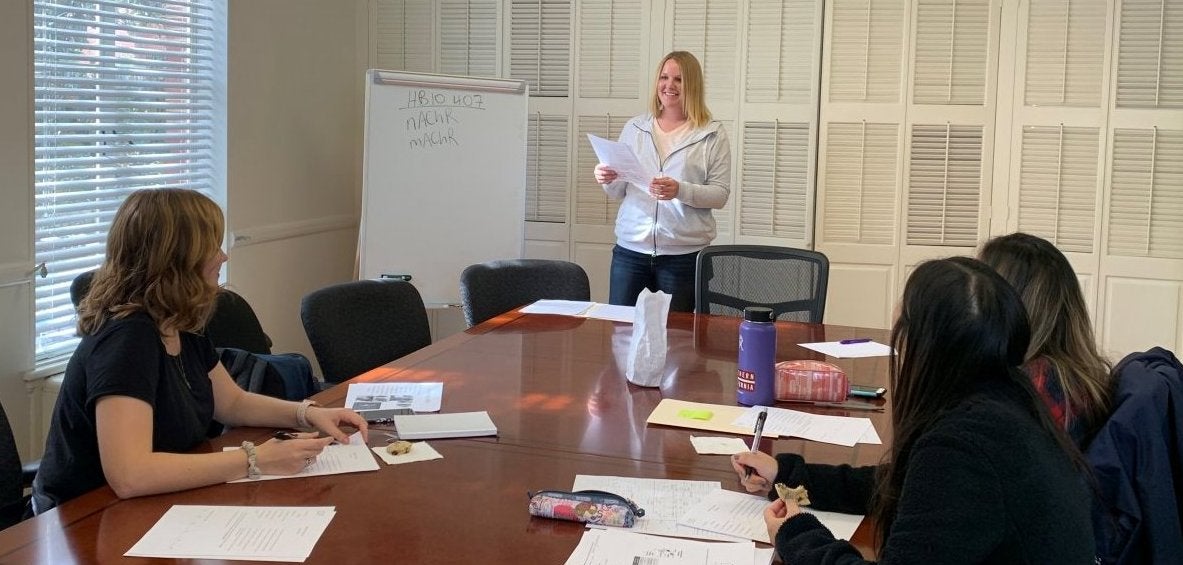USC HBIO Peer Tutoring Program
Why use a Peer Tutor?
From time to time, everybody needs extra help in his or her course work. Peer tutoring has proven effective for learning new skills and information because, according to the Social Cognitive theory, modeled behavior is more likely to be adopted if the model is credible and is similar to the learner in gender, culture, or status (Bandura, 1977). Using a Peer Tutor may provide students with some extra academic support and motivation to face the challenging courses offered in the Human Biology program. Tutoring is not meant to replace time spent in the classroom; however, it can enhance the learning experience of students in the course.
Why become a Peer Tutor?
As a Peer Tutor for HBIO, you will have the chance to help your fellow students by providing academic support and promoting methods to enhance scholastic performance (including time management, study skills, organizing notes, etc.). Tutoring will also benefit you by reinforcing your knowledge in the content areas in which you tutor.
How does the HBIO Peer Tutoring Program work?
Students who have successfully completed an HBIO course at USC with an A or A- may be considered for a Peer Tutor position. The Peer Tutor for a course will facilitate 3 to 4 sixty minute weekly review sessions for the target course throughout the semester. The Peer Tutor must attend class meetings, take notes, do the assigned reading and homework, and communicate with the course instructor.
What are the qualities of a good Peer Tutor?
- Good communication skills, including listening, speaking, and observing
- Patience
- Time management skills
- Professionalism (dependability, punctuality, etc.)
- Empathy
- Good study habits
What are the benefits of being a Peer Tutor?
- Improved knowledge and understanding of subject matter
- Improved interpersonal and communication skills
- Satisfaction of helping others
- Confidence and self-efficacy
- Extra spending money
What are the responsibilities of a good Peer Tutor?
- Tutors should be prepared to set up regular tutoring sessions (3–4) 60 minute sessions per week with tutees and maintain tutoring relationships with those students throughout the semester. Tutors may work a maximum of 10 hours per week.
- Tutors will attend all lectures, take notes, do all assigned homework and reading, confer with the professor, and create worksheets based on the course material for each week. Using the worksheet as a guide, tutors will assist students in gaining the skills, facts, concepts, and the confidence they need to learn on their own. Please note: Tutors should never handle any student work, including assignments, quizzes, or exams. Tutors are NOT responsible for helping proctor exams, nor should they assist with any grading responsibilities for the course.
- Tutors should establish mutual expectations early in the semester, maintain confidentiality, respond to correspondence in a timely manner and support student tutees with encouraging and constructive feedback.
- Tutors will be responsible for ensuring all student tutees fill in sign-in sheets at each review session.
- Tutors should meet with student tutees in open areas, including lounge spaces of residence halls, libraries, library study rooms, eating establishment, or university lounge spaces. No tutoring will be conducted in resident hall rooms or apartments, neither on nor off-campus.
- Tutors must complete payroll sheets and tutoring logs (Please contact Maribeth Hernandez [maribeth@usc.edu] to set up payroll). Tutors will also be responsible for turning in weekly timecards via Workday.
- Tutors will submit tutor logs/reports to Dr. Gioia Polidori (AHF B40) upon the completion of tutoring sessions. Please be sure to do so in a timely manner.
- At the end of the semester, tutors will help recruit students to write thank you letters to the Fatehi family, whose donation to the Human Biology program has made the HBIO Peer Tutoring Program possible. A prompt will be provided to the student and tutees later in the semester.
Please do not hesitate to contact Dr. Polidori (gpolidor@usc.edu) with any questions, concerns, or comments throughout the semester.
